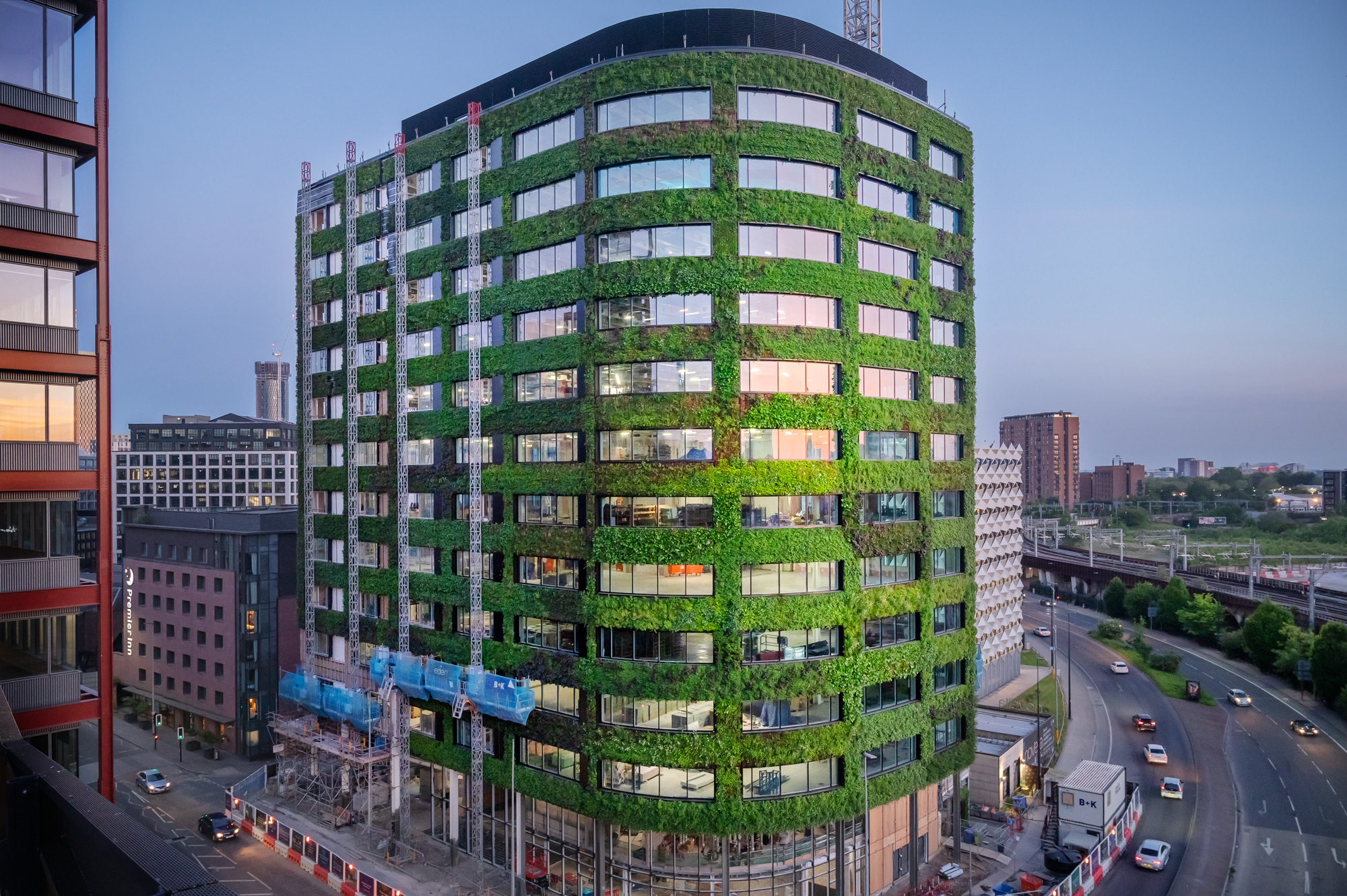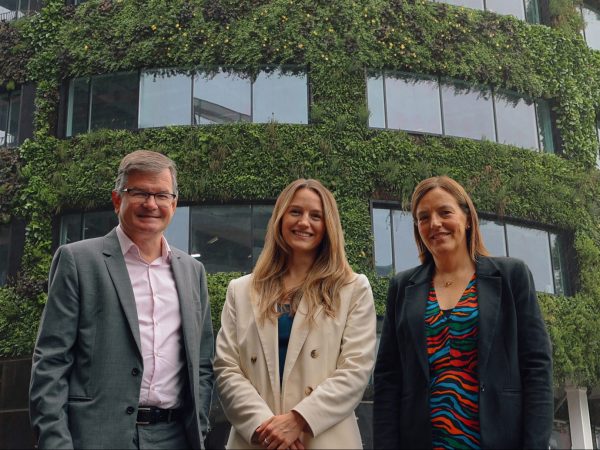Trailblazing Eden becomes the UK’s first ever new-build building to achieve coveted 5.5 (out of 6) star rating
Eden, a £36 million, 115,000 sq ft 12-storey office building in New Bailey, Salford, developed by The English Cities Fund (ECF) has achieved a 5.5 NABERS ‘Design Reviewed’ Target Rating – the first new build building in the UK to achieve this record-breaking certification. Due to complete in late summer, Eden brings a unique workspace opportunity to organisations seeking one of the UK most sustainable premises.
What is a NABERS rating?
Like the efficiency ratings that you get on your fridge or washing machine, NABERS provides a rating for the energy efficiency of offices. Their one- to six-star scale helps building owners to understand how their building performs compared to other buildings. To date there are only 20 buildings that have been certified through the independent design review ranging from 4 to 5-star rating, Eden is one of two with the highest 5.5 star target rating, with the other building being a refurbishment.
Once complete, Eden will be enabled to run solely on 100% renewable electricity, with no gas heating or hot water, and has been designed using the UK Green Building Council’s 2030-2035 operational energy targets. Designed by Make Architects, Eden is also a LETI (London Energy Transformation Initiative) pioneer project (a group of projects that seek to achieve KPI targets in line with LETI’s Climate Emergency Design Guide).
Phil Marsden, Director of Project Management (North West), Muse, and key to the genesis of Eden, comments: “Eden’s creation was motivated purely by the ambition to build the UK’s most sustainable and environmentally considerate commercial building. We are thrilled with the result and have learnt so much; learnings we look forward to sharing with our sector to help build a brighter future, together.”
What is Design for Performance?
The UK has historically had a design-for-compliance culture which has led to a ‘performance gap’ between original design intent and how a building truly performs in-use. To counter this, Design for Performance is the process where a developer or owner commits to design, build and commission a new office development or major refurbishment to achieve a specific NABERS UK Energy rating during the project design and verify it once the building is operational through the NABERS UK Energy for Offices rating scheme.
What about Whole Life Carbon?
During the design stage of the scheme’s inception, partners undertook early-stage, whole-life, and upfront embodied carbon assessments to eliminate waste and reduce the building’s whole carbon footprint. Sustainable materials have been used throughout Eden where possible, such as recycled steel for reinforcement, 40% cement replacement for the substructure and 30% cement replacement for the superstructure. This results in Eden reducing its upfront embodied carbon intensity down to 662kgCO2/m2, compared with over 1100kgCO2/m2 for a typical development of this type.
Will Eden be smart enabled?
Eden will be kitted out with the latest in smart tech solutions to improve resource efficiency, with upgraded insulation in line with the Passivhaus standard, enhanced ventilation to improve the flow of fresh, clean air, along with an air source heat pump to provide low-carbon heating, hot water, and cooling.
What does it all mean for occupiers?
Simon Wyatt, partner, Cundall, and member of the UK Green Building Council’s Members Advisory Committee, said: “Eden is truly ground-breaking in the world of construction –ECF has been innovative in the truest sense in how it has gone about reducing the carbon impact of the build and the building’s eventual operational performance. What this means for occupants and investors is greater ROI – a happier, healthier, and higher performing workforce and work environment, reduced energy consumption, ESG targets hit and so forth… it is a win/win for all involved.”
Eden is a key part of ECF’s (the strategic joint venture between nationwide placemaker, Muse, Legal & General, one of the UK’s leading financial services groups and a major global investor, and Homes England, the Government’s housing and regeneration agency), £1bn transformation of the Salford Central area of the city into a diverse mixed-use destination, complete with a bustling commercial district, alongside a vibrant community of homes and amenities, to provide something to suit everyone’s needs.
Commenting, Paul Dennett, Mayor of Salford said: “Our city has a proud history of innovation, from the first steamboat to the first swing aqueduct, and we are thrilled to add Eden to that list – a sustainable endeavour Salfordians will be working hard to add to for the benefit of our city and future generations to come.”
The building is due to complete late Summer 2023 when it will also hold the title of having one of Europe’s largest living wall at 36,000 sq ft. This façade has been designed to remove air pollutants including carbon, reduce urban temperatures offering thermal benefits to occupiers, and deliver a 174% net gain in the biodiversity of the area, while at the same time providing high-quality green spaces. Alongside this, the façade has a range of health benefits, with Eden designed to enhance occupier health, wellbeing, productivity and will embrace the WELL Building Standard principles, which aim to improve health and human experience through design. Eden is also one of a small number of LETI pioneer projects and is on target to achieve a BREEAM Outstanding rating.
Last year, Homes England, Legal & General and Muse, reconfirmed their commitment to their long-standing partnership for a further ten years, to December 2036. This will enable the ECF to continue to deliver against its mission to transform deprived, urban areas and create exceptional new places across England, tripling its development potential to date. This commitment will allow for an additional 6,600 homes to be built and allow ECF to reinvest its capital into new, long-term urban regeneration schemes that will support the Levelling Up of towns and cities, creating places where businesses want to invest, and people want to live and socialise.




